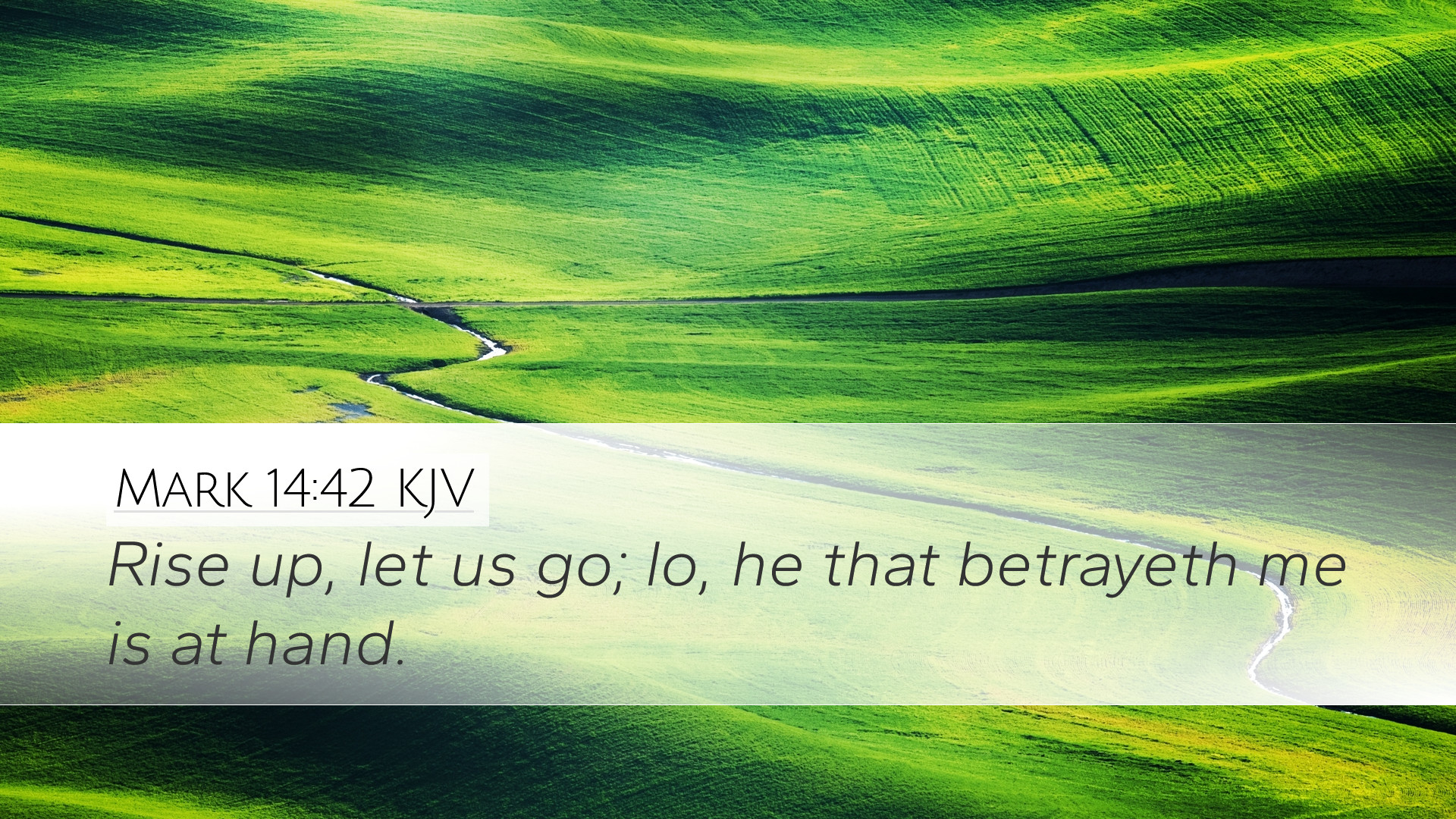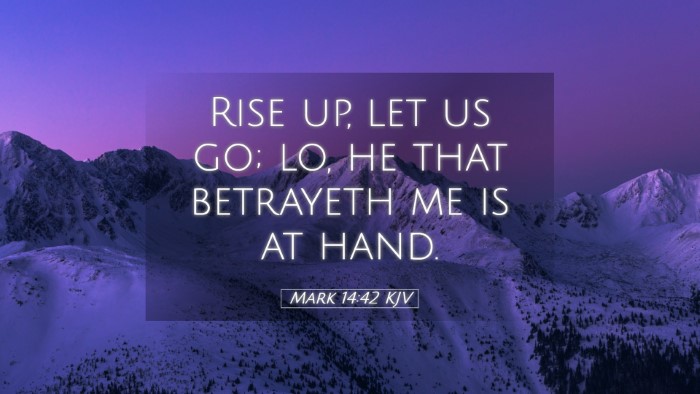Commentary on Mark 14:42
Mark 14:42 states: "Rise up, let us go: behold, he that betrayeth me is at hand."
Contextual Background
This verse occurs during the climactic moments of Jesus' life, specifically in the Garden of Gethsemane, a place of deep sorrow where He contemplates His impending crucifixion. The events leading up to this moment are critical, as they reveal the contrasting themes of betrayal, divine will, and human weakness.
Before this declaration, Jesus has been praying fervently, wrestling with the gravity of what lies ahead. The disciples, however, have struggled to maintain vigilance, symbolizing the human tendency to succumb to fatigue, both physically and spiritually.
Exegesis of the Verse
The phrase "Rise up, let us go" indicates a transition, moving from a state of anguish and prayer into action. This call can be interpreted as Jesus inviting the disciples to accompany Him, emphasizing the importance of community in moments of trial.
Furthermore, the declaration "behold, he that betrayeth me is at hand" underscores the immediacy of Judas' betrayal. The term "betrayeth" points to an intimate act of treachery, and by using "is at hand", Jesus foreshadows the arrival of Judas and the impending events that will lead to His trial and crucifixion.
Theological Insights
-
Human Weakness and Divine Purpose:
This moment illustrates the juxtaposition of human frailty and divine intent. While the disciples fail to stay awake and watch, Jesus remains resolute, highlighting His commitment to the mission set before Him.
-
Jesus’ Foreknowledge:
Jesus' awareness of He who betrays Him reflects His divine omniscience. This knowledge does not lead Him to despair but rather to action, showcasing His control over impending events.
-
The Nature of Betrayal:
Jesus’ acknowledgment of His impending betrayal by one close to Him serves as a stark reminder of the depths of human sin. Judas’ actions serve as a cautionary tale regarding the dangers of proximity to divine truth without genuine faith.
Insights from Public Domain Commentaries
Matthew Henry
Matthew Henry reflects on the sorrowful scene in Gethsemane, emphasizing that Jesus' cry summarizes the urgency of His mission. Jesus, knowing the gravity of the moment, gathers His disciples, calling them to rise from their slumber and prepare for the events that will soon unfold. Henry points out the significance of vigilance in the face of temptation and the need for prayer to withstand trials.
Albert Barnes
Barnes emphasizes the aspect of betrayal. He considers that Judas' approach symbolizes the end of self-delusion. Jesus acknowledges the reality of the situation, presenting it as an inevitable result of His ministry. Barnes remarks on the contrast between the disciples' lack of understanding and Jesus' clear awareness of His death. This contrast serves to elevate the gravity of the moment.
Adam Clarke
Clarke provides insight into the emotional state of Jesus during this prayerful moment. He notes the struggle Jesus experiences, one that is filled with both sorrow and a deep love for humanity. Clarke interprets Jesus' command to "rise" as not merely a physical action but as a spiritual encouragement for the disciples to awaken to the reality of their surroundings and their own vulnerabilities.
Application for Modern Believers
The implications of Mark 14:42 extend to Christians today, serving as a poignant reminder of several core tenets of faith:
-
Awareness of Temptation:
Believers are called to remain vigilant in prayer, particularly in the face of trials. The weakness displayed by the disciples warns against spiritual complacency.
-
Recognition of Betrayal:
Understanding that betrayal can come from within encourages believers to guard their hearts and maintain fellowship with genuine, supportive communities.
-
Divine Sovereignty:
This verse reassures believers of God's control over situations. Despite apparent chaos, believers can trust in His plan and providence that works for good.
Conclusion
Mark 14:42 is a profound declaration that encapsulates the tension between human frailty and divine resolve. As Jesus prepares to face betrayal and suffering, He invites His disciples—and by extension, all believers—to be alert, aware, and engaged with the realities of their faith. This verse stands as both a warning and a strong call to action, urging Christians to rise up in prayer and fellowship as they navigate their own times of trial.


